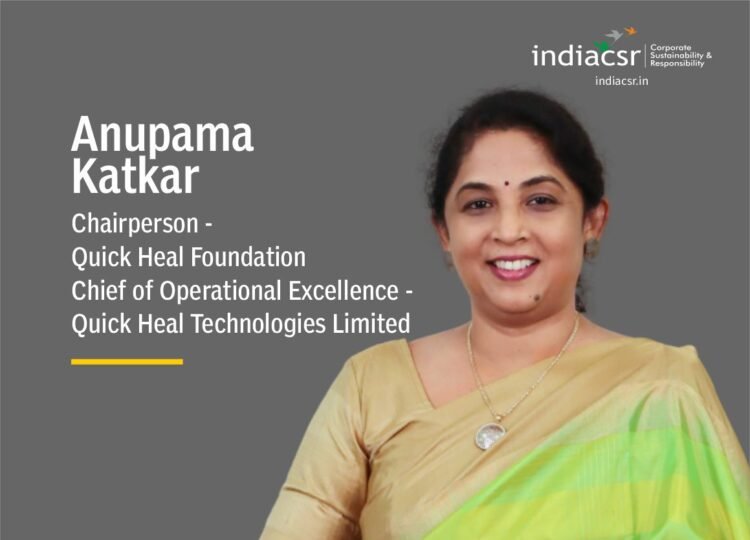The India CSR Interview Series features Ms. Anupama Katkar, the Chairperson of Quick Heal Foundation and the Chief of Operational Excellence at Quick Heal Technologies Limited. The interview covers topics such as the impact of the initiatives, why cybersecurity education is necessary, tips to stay safe from cyber fraud, and the objective of Cyber Shiksha for Cyber Suraksha Awards. It also discusses the need for cybersecurity education due to rapid digitization and the rise in cyber crimes. Quick Heal Foundation has designed an e-booklet available on their website and conducts street plays to educate people on cyber safety. Excerpts:
Q1. What is the key emphasis of Quick Heal Foundation? What all initiatives have been taken so far?
We are driven by our purpose of ‘securing futures’ by enabling communities and the society at large. Hence our programs are designed to be in line the United Nations Sustainable Development Goals to create a better India with better opportunities for all. Our key focus areas are cybersecurity awareness and better healthcare for all. In this process we also work to enhance employability through soft skills trainings.
Our “Cyber Shiksha for Cyber Suraksha” program aims to create awareness in the society through street plays, workshops, and webinars for students across India. Furthermore, under our program “Earn and Learn” we train and motivate the volunteers to spread cyber security awareness amongst schools and colleges. We have organized workshops for underprivileged sections of society, like street vendors educating them on how to minimize risks on the internet. We have included all our employees, partners, schools & universities, local police, authorities, state administrations and corporates across the country. We proactively spread awareness on cyber threats through e-learning on our website, social media and PR campaigns. Since creating better access to healthcare is also one of our primary objectives, we have been working in the public health space ever since inception. Under our “Arogya Yan” initiative, we donate state-of-the-art, fully equipped medical vans to NGOs operating in the rural areas of the country.
Post Pandemic we observed that there was marked increased in mental trauma of underprivileged students coming from slum areas in Pune. We then under our program, ‘Arogyam Mansampada’, proactively designed and conducted a 3-hours long session to address their anxiety, stress, trauma and phobia and other problems including lack of attention and concentration.
Q2. How is the impact of the initiatives? And how many are being benefitted from it?
The true impact of our initiatives comes in a non-tangible form, comprising a multitude of emotions like security, empowerment, self-awareness, gratitude, and above all, joy. We couldn’t ask for anything beyond making ‘Cybersecurity a fundamental right for all’ while being carried forward to even the remotest corners of the country, and the smiles that we get to see on the faces of people who benefit from our health and educational programs.
In tangible terms, we take pride in having touched the lives of more than 4 lakh rural residents and 448 members of President Protected Tribes through our Arogya Yan initiative. We have donated 15 vans so far in 10 different states of India covering 600+ remotely located villages. Our “Cyber Shiksha for Cyber Suraksha” program has endeavored to touch more than 30 lakh lives to date. Through “Earn & Learn” program in FY23 alone, we have touched more than 7 lakh lives. With our ‘Arogyam Mansampada’ program, we managed to reach out to more than 9000 students and over 300 teachers in Pune.
Q3. Why does cybersecurity education is need for the hour?
The recent union budget announcements are indicative of our government’s focus to build a knowledge and technology driven economy. Several measures in line with this vision have been announced. With the government promoting digitization in every aspect of the country’s functioning, we are witnessing a tremendous expansion of smartphone user base and a rise in internet connectivity in our country. Rapid digitization, work from home and online education post pandemic, have further widened the security perimeter, making cloud, network, and devices vulnerable. Therefore, cybercrimes are on a rise, like never before. Lack of awareness on cybersecurity is the root cause of India becoming a victim of these crimes. Hence, awareness on safe internet practices and using the right cyber security solutions are the need of the hour. All our programs thus are designed consciously to promote digital awareness amongst masses.
Q4. What do you suggest to a layman to be safe from cyber fraud?
The easiest way to safeguard yourself from malicious attacks is to install a good anti-virus solution, and to activate your firewall. It keeps you protected from viruses, malware and rootkits. It is advised to always keep the security software updated by applying latest patches that are sent to your system to block and prevent new emerging threats.
In a bid to educate the community at large on how to identify, report and mitigate threats online, we have designed an e-booklet which is available on our website in multiple languages. Under one amongst many of our CSR programs, we conduct street plays and work closely with local administrations, NGOs, Universities and Police to educate the marginalized sections of the society on cyber safety. We have also organized workshops for underprivileged sections of society, like street vendors educating them on how to minimize risks on the internet.
Q5. What is the objective of Cyber Shiksha for the Cyber Suraksha Awards?
‘Cyber Shiksha for Cyber Suraksha’ has been a very special program for us, primarily since it helps us achieve our purpose of ‘securing futures’, and our goal of ‘making cyber security a fundamental right for all’. The first edition of Cyber Shiksha for the Cyber Suraksha Awards are a small token of gratitude from us to the many individuals and institutions, without whose support our initiative could never have been a success. All our partners, including the various educational institutions that became a part of our mission, the DSCI, Maharashtra Cyber, and the local police have provided their invaluable support to the ‘Cyber Shiksha for Cyber Suraksha’ initiative. Our warriors – the students, torch bearers and the universities and teachers – have done phenomenal work in spreading awareness on cyber safety, and the awards are a small gesture to acknowledge and celebrate those efforts.
Q6. What kind of programs are needed in India to raise awareness about cybersecurity?
The government’s vision of ‘New India’ is more digital, self-sufficient, connected, and ambitious. With the country’s internet user base growing and internet penetration increasing by the day, it is extremely important for robust steps to be taken on policymaking level in order to increase cyber literacy in the country.
It is important to foster cyber safety as a culture, empowering everybody in the organization and value chain with cyber safety education. It is also imperative for responsible industry stakeholders to join forces to spread awareness of safe digital practices to vulnerable communities at large.
(India CSR)






















